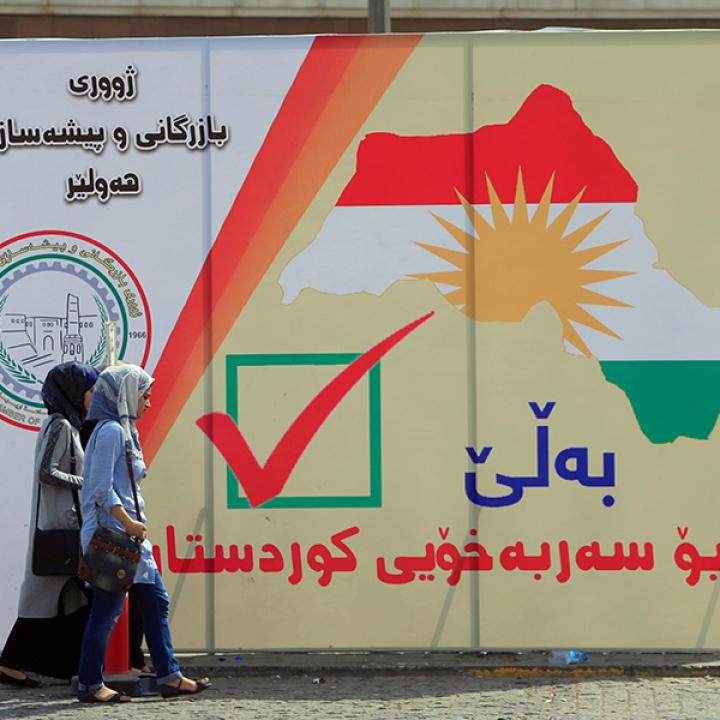
- Policy Analysis
- Fikra Forum
A Better Future for Syrian Kurdistan

November 29, 2017
As the peaceful phase of the Syrian revolution gave way to a destructive sectarian conflict and terrorist organizations gained prominence, hundreds of thousands of Syrian Kurds fled to Iraqi Kurdistan seeking security and job opportunities. Syrian Kurds welcomed Iraqi Kurdistan’s recent independence referendum, whether they were in Iraqi Kurdistan, Syria, or elsewhere throughout the world. The two Kurdish populations have shared interests and a shared destiny: the interests of Iraqi Kurdistan require eliminating the risk of a blockade from Turkey, Iran, and Iraq, and would benefit from Syrian Kurdistan’s territory in order to reach the Mediterranean Sea. Thus, the referendum should have had political, economic, and security benefits for Syrian Kurds and strengthened both sides.
Many Syrian Kurds are receptive to the political model of governance in the federal Kurdistan Region. Syrian Kurdistan’s economy consists of oil, gas, iron, and the many products resulting from the area’s fertile agricultural planes. Many Kurdish men and women are well-educated, and they are well represented among the administrative cadres. There has been an active political movement for decades that supports democracy and peace, rejects extremism, and emphasizes secularism.
Just as Iraq’s Kurdistan Region respected the rights of all of its constituents regardless of ethnicity, the Kurdish National Council in Rojava recognizes the rights of other non-Kurdish constituencies, like Syriacs, Assyrians, Arabs, and others.
At present, Russia holds sway in the areas of Syria under regime control as well as in the northwest, where there are Kurdish regions like Afrin and the Kurd Mountains. However, the United States has influence in the other principal Kurdish regions, including Kobani, Girê Sipî (Tal Abyad), and al-Jazira, in northeastern Syria. The Kurdish movement is inclined towards working with the United States due to its generally credible history of reliability. Nevertheless, the Trump administration’s policy towards the Kurdish people has been ambiguous and contrasts with the principles and values that it supposedly advocates; we saw that recently in the way that it handled the independence referendum, on which it took a neutral stance—as if it considered the victim and the executioner to be on equal footing. The United States should unequivocally and transparently demonstrate its credibility and support for Kurdish people’s right to self-determination.
As for Russia, despite raising the issue of “Kurdish self-government,” the Russian regime is not democratic in the true sense of the word, nor does it treat Syria with anything other than an authoritarian hand. It has committed indiscriminate violence and killing and destruction against the Syrian people. Furthermore, it continues to support a criminal and murderous regime that exterminates its own citizens.
Now, with the Islamic State on the verge of collapse, the international community—and particularly the United States and Europe—must actively seek a political solution in Syria. Syrians—and the Kurdish people in particular—have suffered badly. The Democratic Union Party (PYD) implemented repressive practices against the Kurds by imposing armed conscription, persecuting and kidnapping youths, imposing royalties, attempting to extinguish political activism via arrests and deportations, and attacked and closed the offices of political parties affiliated with the Kurdish National Council. As a result, a large number of Kurds were forced to flee Rojava.
The PYD and its followers circumvent the issue of the right to a Kurdish state. Instead, they propose utopian solutions of Öcalan’s philosophy, which is incompatible with a people’s right to self-determination and runs contrary to the ambitions of many Kurdish people, who no longer trust Islamist and socialist ideas.
Despite the Kurdish National Council joining the Syrian opposition coalition—whose charter officially recognized the national rights of the Kurdish people—that recognition did not materialize into reality. Similarly, after the emergence of the High Negotiations Committee at the Riyadh conference of the High Negotiations Committee, the Committee ignored the charter related to Kurdish rights and only recognized the right to citizenship in the London charter, which caused serious disappointment among the Kurds and led to a loss of trust in the opposition. As the end of the fighting appears closer, Kurds are deeply concerned about their future and rights in the new Syria. It is thus in the Kurds’ best interest to have their own political platform, especially since they form a large block in comparison with other constituents.
The Kurdish platform must incorporate Kurdish groups who believe, in speech and in deed, in the rights of the Kurdish people on the basis of a Syrian federation and a Syrian Kurdish federal region. This includes ensuring and respecting the rights of other constituents. In order for efforts at uniting the Kurds to succeed and to ensure of protection of Syria’s Kurdish region, there must be a single, unified Kurdish military force. There are thousands of Kurdish fighters drawn from Syria’s Kurds, known as the “Peshmerga Rouge,” which is currently in Iraqi Kurdistan and plays a key role in combatting terrorism. It is a force with a clean record that respects human rights and protects civilians during battle. It sacrificed many of its forces defending the Kurdish people, fighting terrorism, and safeguarding civilian return to Syrian Kurdistan.
The new Syria can only ensure stability, development, and peace—and keep terrorism and authoritarianism at bay—if it becomes a federal state with a pluralistic, secular democracy. Syria contains many national, religious, and sectarian elements. Each group has the right to political equality.
